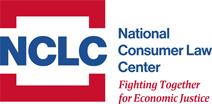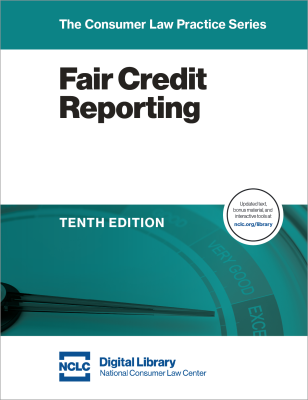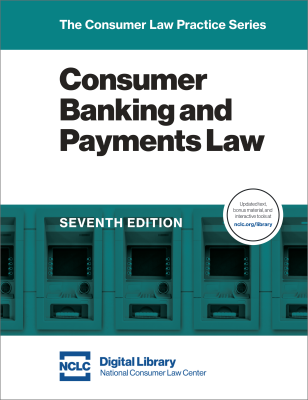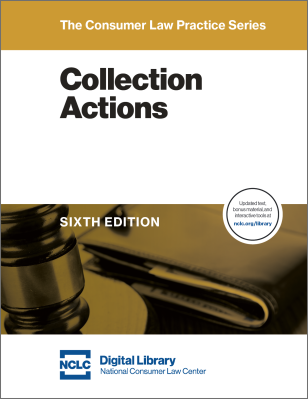This article describes the practice manuals on the NCLC Digital Library that are of special utility for attorneys practicing in areas outside of consumer law:
- Landlord-Tenant law;
- Employment law;
- Public benefits law;
- Family law;
- Criminal law;
- Class actions.
Information about free, discounted, and paid subscriptions to access these practice manuals is described at the end of this article. Legal services attorneys doing landlord-tenant, public benefits, or family law should note that your office often already has a complete set of the treatises listed below.
Landlord-Tenant Law Resources
- The National Housing Law Project’s HUD Housing Programs: Tenants’ Rights (the “Green Book”) is available in print and online at the NCLC Digital Library. The new 2025 Sixth Edition is the quintessential guide to understanding HUD’s housing programs—the product of over 50 years of legal experience specifically focused on HUD housing law, decades of successful high-impact litigation, and a deep understanding of intricate federal housing policy.
- Landlord-tenant problems often involve gas, electric, or water utilities, including terminations, excess charges, affordability, access, and security deposits. NCLC’s Access to Utility Service covers all these topics in depth and has a special chapter on tenant strategies for maintaining service when landlords are unable or unwilling to pay the utility bill for the whole building.
- NCLC’s Surviving Debt Chapter 20 is a unique overview of how to respond to an eviction and how to get out of a lease at minimum cost. The chapter is written by an experienced National Housing Law Project attorney.
- Tenant screening agencies play an enormous role in determining if individuals can find a rental unit. The right to remove inaccurate information from tenant screening reports and whether tenants can keep eviction and other court records out of their credit report are examined in NCLC’s Fair Credit Reporting.
- Challenges to landlords’ collection of past due rent and junk fees and charges, and unreasonable offsets from security deposits, are analyzed in NCLC’s Collection Actions § 12.2. See also NCLC’s Fair Debt Collection (particularly § 7.4.12) concerning unfair and deceptive debt collection practices regarding rental debt.
- Tenant rights when a landlord files bankruptcy are spelled out in NCLC’s Consumer Bankruptcy Law and Practice Chapter 18, particularly § 18.8.
- Tenant rights when a constable or other official removes the tenant’s property to a warehouse are addressed in NCLC’s Repossessions § 15.7.4. See also NCLC’s Unfair and Deceptive Acts and Practices § 8.2.8.4.
- A powerful source of remedies (including attorney fees) for a wide array of unfair or deceptive landlord practices or violations of a state’s landlord-tenant code is a state’s unfair and deceptive acts and practices (UDAP) statute. Most UDAP statutes apply to landlord-tenant practices. See generally NCLC’s Unfair and Deceptive Acts and Practices, and particularly §§ 2.2.6 and 8.2.
- When an action against a landlord or housing agency involves federal court, an invaluable treatise is the National Center for Law and Economic Justice’s new edition of the Federal Practice Manual for Legal Aid Attorneys, available online at the NCLC Digital Library.
- For class actions, NCLC’s Consumer Class Actions is a key resource for both those new to and experienced with class actions covering any subject area.
Employment Law Resources
- NCLC’s Consumer and Worker Arbitration Provisions examines how to defeat an arbitration requirement and how to bring an individual, class, or mass arbitration action. Its focus is as much on employment cases as on consumer law cases and has been revised with the help of employment attorneys. It also contains special sections applicable just to employment law cases, such as discussions regarding transportation workers.
- There are extensive legal requirements and employee rights concerning employer use of commercial background check reports, credit reports, investigative reports, and other consumer reports in hiring and in other employment decisions. These are all detailed in the definitive treatise on the subject, NCLC’s Fair Credit Reporting.
- Issues involving employers’ wage payment methods to its employees are examined in NCLC’s Consumer Banking and Payments Law. For example, payroll cards are treated at § 8.8 and charges for employees cashing pay checks at the employer’s own bank at § 4.7.
- NCLC’s Consumer Banking and Payments Law § 8.9 covers issues relating to the use of prepaid cards to pay unemployment compensation benefits.
- New services offered through employers and directly to consumers for the payment of “earned wages” (a disguised form of payday loan) are discussed in NCLC’s Consumer Credit Regulation § 9.10 and in NCLC’s Truth in Lending § 2.8.10.
- Federal and state protections not only place limits on wage garnishment but also protect employees from discharge because of a wage garnishment. See NCLC’s Collection Actions Chapter 15.
- Employee rights when the employer goes bankrupt are addressed in NCLC’s Consumer Bankruptcy Law and Practice Chapter 18, particularly § 18.7.5.
- For federal and state False Claims Act/whistleblower actions against an employer, see NCLC’s Federal Deception & Abuse Law Chapter 10.
- A handy and free practice manual for federal litigation is the National Center for Law and Economic Justice’s new edition of the Federal Practice Manual for Legal Aid Attorneys, available online at the NCLC Digital Library.
- For class actions, NCLC’s Consumer Class Actions is a key resource for both those new to and experienced with class actions covering any subject area.
- Although courts in most states hold the state unfair and deceptive acts and practices (UDAP) statute and its potent remedies inapplicable to employer-employee disputes, California and Hawaii are notable exceptions, and other states may allow UDAP claims in certain employment situations. See generally NCLC’s Unfair and Deceptive Acts and Practices, particularly § 2.2.9.
Public Benefits Law Resources
- A key resource for any public benefits practice involving federal litigation is the National Center for Law and Economic Justice’s new edition of the Federal Practice Manual for Legal Aid Attorneys, available online at the NCLC Digital Library.
- For a detailed chapter on the rules governing EBT cards used for SNAP and WIC benefits and for a variety of state benefits, see NCLC’s Consumer Banking and Payments Law Chapter 10. The chapter is now updated by two experienced public benefits attorneys.
- Other types of prepaid cards used to pay public benefits are discussed in § 8.9 of NCLC’s Consumer Banking and Payments Law.
- NCLC’s Consumer Banking and Payments Law, particularly Chapter 11, details rights of recipients of Social Security, SSI, or other federal benefits concerning the method of payment—the Direct Express card, direct deposit, a private market prepaid card, and remaining options for check payments.
- For detailed analysis of LIHEAP, Low-Income Weatherization Assistance, Lifeline, Universal Service, and water, gas, and electric utility affordability programs, see NCLC’s Access to Utility Service.
- For the definitive treatise on HUD housing programs, see the National Housing Law Project’s new 2025 Sixth Edition of HUD Housing Programs: Tenants’ Rights (the “Green Book”), housed on the NCLC Digital Library.
- A survey of federal and state public benefits is found in NCLC’s Surviving Debt Chapter 9, with contributions from seven experts on public benefits.
- For rights to protect public benefits deposited in a bank account, see NCLC’s Collection Actions Chapter 15, particularly § 15.3, and NCLC’s Consumer Banking and Payments Law Chapter 12.
- For rights concerning government collection of overpayments of Social Security or other benefits, see NCLC’s Collection Actions Chapter 10.
Family Law Resources
- Debts incurred by an abusive partner often pose problems for victims of domestic violence, including debts in the victim’s name through coercion or identity theft. A discussion of victims’ rights and best strategies are found at NCLC’s Collection Actions § 12.3. A similar discussion is found in NCLC’s Surviving Debt Chapter 21.
- Home loan modifications—open to the original owner—can be difficult to access for a spouse awarded a home in a divorce proceeding. The rights of such successors in interest are examined in detail throughout NCLC’s Mortgage Servicing and Loan Modifications.
- Credit reports used in divorce, child support, or paternity proceedings and to determine child support levels are discussed in NCLC’s Fair Credit Reporting, particularly §§ 7.2.9, 7.4.2.
- While government benefits are often exempt from judgment creditors, there are special exceptions allowing for those benefits to be seized for child support obligations. See NCLC’s Collection Actions § 14.4.2.
- Special rules allow greater wage garnishment amounts for child support and alimony obligations than for other types of debts. See NCLC’s Collection Actions § 15.2.1.5.4.
Criminal Law Resources
- NCLC’s Collection Actions Chapter 11 examines defenses to payment of fines, fees, restitution, and other charges assessed in a criminal proceeding, as well as an individual’s options to discharge the debts in bankruptcy, file affirmative litigation concerning unfair criminal justice debt practices, and other actions concerning criminal justice debt.
- NCLC’s Collection Actions Chapter 8 comprehensively covers defenses to criminal and civil actions relating to dishonored checks.
- NCLC’s Collection Actions § 11.4.3.1.3 treats federal government collection of criminal restitution debt owed to the federal government.
- NCLC’s Fair Credit Reporting sets out rights concerning correction of and disclosure of criminal records by consumer reporting agencies.
- NCLC’s Repossessions § 14.3.9 analyzes consumer rights when criminal prosecution is threatened or initiated for failure to return property acquired in a rent-to-own or other lease transaction. See also NCLC’s Consumer Credit Regulation § 13.5.
- NCLC’s Repossessions § 6.2.4 discusses criminal prosecution for hiding a car to avoid repossession and other actions hindering enforcement of a security interest.
Class Actions Resources
- NCLC’s Consumer Class Actions is a practical litigation guide not only for consumer class actions, but for any type of class litigation. It is a how-to manual for handling every aspect of a class action, designed to be valuable both for small law offices and for established class action firms. It includes practice tips and other contributions from over 20 of the most experienced consumer class action litigators from every part of the country. For 38 years, now in its eleventh edition, Consumer Class Actions has been the go-to practice manual for class action litigation, including sample pleadings and notices.
- Key to many class actions is avoiding an arbitration requirement. NCLC’s Consumer and Worker Arbitration Provisions covers every possible ground to resist arbitration and examines such current issues as who determines arbitrability (court or arbitrator), appeals of arbitrability rulings, and a surprising number of limits on enforceability of an arbitration clause. Also covered is advice on conducting class and mass arbitration.
Paid, Discounted, and Free Access to the Above Titles
Surviving Debt’s digital edition is free to the public. Print copies are $20, including shipping. Bulk discounts are available.
National Center for Law and Economic Justice’s new edition of the Federal Practice Manual for Legal Aid Attorneys is currently available online for free on the NCLC Digital Library. For access, add a free subscription to your library.
Subscriptions to the digital editions of the above NCLC treatises can be purchased individually or, for major savings, as a 21-title Complete Set. Print copies can be added to a subscription. Legal aid offices can purchase individual titles for 50% off or the Complete Set for even greater savings. Visit nclc.org/bookstore or contact [email protected].
NELA members can receive 25% off for an initial subscription to Consumer and Worker Arbitration Provisions.
The National Housing Law Project’s HUD Housing Programs: Tenants’ Rights can be purchased at https://library.nclc.org/GB/subscribe.




